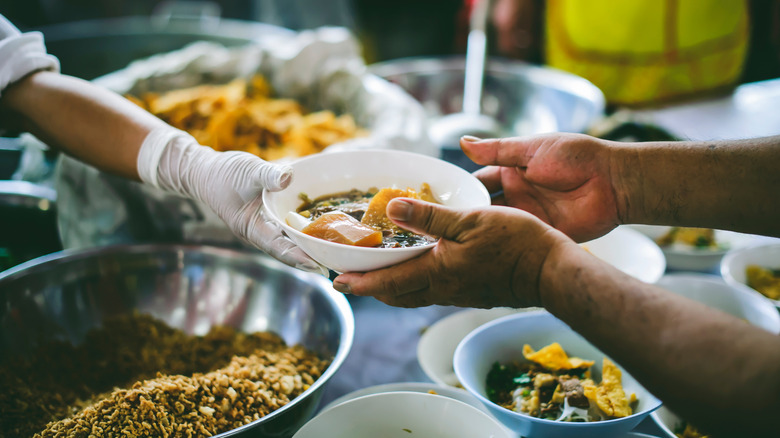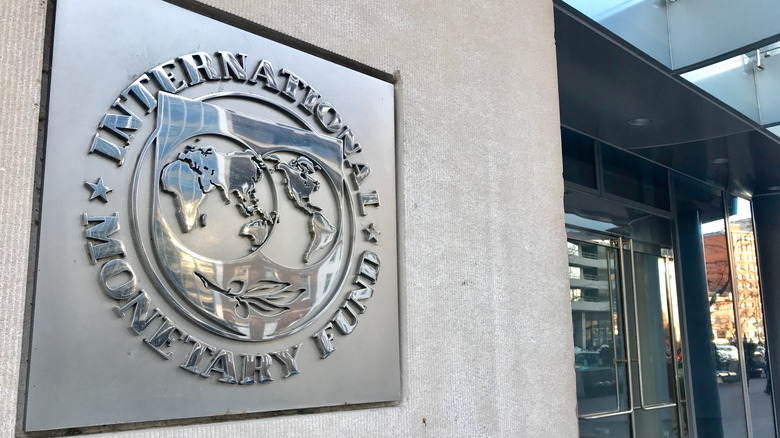Why The IMF Feels Food Subsidies Shouldn't Go To Everyone
In the face of an ongoing global food crisis that has been worsened by pandemic food shortages and the Russian invasion of Ukraine, one of the world's top financial institutions has issued a call of action to global leaders.
Earlier this year, the World Bank made a dire prediction about the rapid progression of ongoing global food shortages. The U.S. State Department has estimated that 193 million people experienced some level of food insecurity in 2021 — up 40 million people from the year before. This number is likely to increase by tens of millions this year as well (via Al Jazeera). According to Reuters, the price of wheat alone is up a staggering 54% from the prior year as a result of the Russia-Ukraine conflict, causing mass food cost increases that have hit the world's most vulnerable populations the hardest.
Now, the International Monetary Fund (IMF) — an independent organization comprised of members from 189 countries that works with governments to help stabilize and strengthen the global economy — has issued new global financial guidance in response to the ongoing food and financial crises (via BBC). The IMF's primary role is to monitor the performance of the global economy, advise nations on the best course of action to improve local economies, and issue up to $1 trillion in interest-free loans to financially unstable countries.
Offering blanket aid could lead to financial peril, the organization warns
Earlier this year, IMF president Kristalina Georgieva urged governments to subsidize rising food and energy costs "in a very targeted manner," with a focus on the poorest populations (via BBC). Now, the fund has doubled down on that languaging, advising global leaders to think strategically about aid spending.
In a blog post, the IMF cautioned world leaders about the economic risks of issuing blanket aid to entire national populations rather than focusing on aid to the most at-risk citizens. Issuing aid to large swaths of the population puts an additional strain on already-unstable national budgets that are still reeling from pandemic relief costs, the organization warned.
In response to recent food and fuel price hikes, over half of 134 countries surveyed by the organization had implemented wide-scale tax cuts, price subsidies, and direct cash transfers in response to the growing global financial crisis. In order to counteract rising food costs and the resulting increase in food insecurity, the IMF has recommended that developed nations primarily invest in expanding social safety nets and domestic food production while implementing temporary economic measures, like subsidized food import taxes, as a safeguard.
Relief funds should be targeted towards the most vulnerable populations
Moving forward, the IMF recommends that wealthy countries with strong existing safety nets should disperse cash funds to only the most financially vulnerable residents, rather than focusing on providing sweeping food subsidies. Meanwhile, developing countries should focus their funds on expanding current safety nets and public aid programs. The organization urges countries with existing food and fuel subsidies in place to slowly eliminate those subsidies in the coming years in order to fend off financial collapse.
"Policymakers should allow high global prices to pass through to the domestic economy while protecting vulnerable households affected by the increases," the organization wrote. "That's ultimately less costly than keeping prices artificially low for all irrespective of their ability to pay."
The monetary fund acknowledges that each country's fiscal strategy for alleviating the impacts of the global food shortages will differ depending on their existing safety nets and the stability of their financial institutions. However, the universal recommendation is to narrow the scope of relief efforts to focus on the poorest and most vulnerable members of society.
As the financial organization notes: "Government policies to mitigate the social impact of rising prices must take these differences into account and ensure that the burden is not disproportionately felt by the poor."


